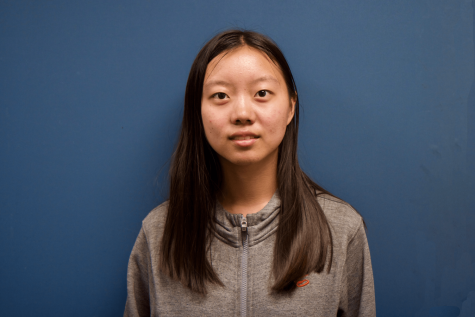A love letter to Wuhan, China
March 24, 2020
You may know Wuhan as the epicenter of a global public health emergency. But people forget that before the coronavirus outbreak and the now-empty streets, there was once bustling traffic, street vendors selling kebabs and cyclists biking to the neighborhood grocery market.
First, some context: my mom was born in Anlu, China, but grew up in Wuhan. She immigrated to the United States by herself for graduate school, majoring in biology. She married my dad, another biologist, had me, had my brother, and later became a patent lawyer for biomedical inventions. They work together to patent my dad’s inventions, and right now, my mom’s been helping my dad out with some machine (don’t ask me for the details because I don’t know either). My dad has flown to Shenzhen, China to work on his invention, and consequently has been quarantined for 14 days.
My mom considers Wuhan her hometown, and goes there to visit my uncle and aunt every once in a while. During the summer of fourth grade, my mom decided to bring my brother and I along with her to visit her family.
The first thing I noted stepping off the plane was the humid air that clung to my clothes. My mother, brother and I made our way across the city by taxi and arrived at an apartment complex. There, I met my aunt, uncle, and cousin for the first time, and also met my grandparents again. They were very kind and caring, though it was hard to communicate with them because of my lack of Chinese speaking skills and my overall social timidness.
I spent about a month in Wuhan, and while I don’t remember everything, I do remember some of the little things: I remember always begging my mom and grandparents to go out every night on the street and buy spicy lamb kebabs in the evening, going back to my aunt and uncle’s apartment, and sitting on their carpeted floor pretending to roast them with my cousin and brother over an imaginary fire. I remember coming down with something, either stomach flu or food poisoning, lying in the hospital with the IV drip needle inserted into my hand. Outside my window in the shadow of night I saw the city — the city lights of the hustle and bustle that was Wuhan — reflecting into my room.
I remember sitting in a clay sculpture class that my mom urged me to join, barely understanding a word and too nervous about my terrible Chinese to converse with the classmates. I remember pouring the clay into a mold of a cartoon boy and girl holding the word love together, feeling excited when it came back to me after being baked in a kiln and painting it in the colors I liked. I remember bringing it to my aunt and uncle’s apartment, and leaving it there before I went back to my home in the U.S. Maybe it’s still there. I have no way of knowing, at least not now.
On the last day before my mom, my brother and I went home, we traveled by taxi to a restaurant, while watching bikers turn the corner in a lane fenced off with a blue pole. I don’t actually remember the taste, but I remember eating noodles and hotpot, going home and thinking, “I wish I could eat there again.” And I still do, all the time.
Since then, I still enjoy parts of my mom’s Wuhan culture. There is an authentic Wuhan restaurant in Cupertino which I go with my family to regularly. Almost every time, we get my favorite spicy lamb kebabs, dou pi (a savory pancake-omelette wrapped around sticky rice, meat, mushroom and bamboo shoots) and liang mian (cold noodles in peanut sauce). My mom video-calls her family regularly, and I can tell whenever she’s talking with them because instead of talking in Standard Mandarin like how she always talks to us, she uses the Wuhan dialect to speak to them. It’s endearing, in a way; the nature of the Wuhan dialect makes anyone speaking it sound jovial and warm-hearted. And that’s exactly how I remember the people of Wuhan: warm-hearted and caring.
I remember the day I first heard about the coronavirus, back in January, when the coronavirus hadn’t yet spread so far and the situation hadn’t become so serious that the World Health Organization deemed it a pandemic. I had been watching some TV channel, when I heard them mention about some kind of contagious virus that was starting to spread. The TV screen that day had a map of China, and a red dot labelled with the name of a very familiar city.
“They say it originated from Wuhan, China,” the TV reporter said.
At the time, I wasn’t too worried, partly because I hadn’t actually heard any of the details of the virus itself, but I remember immediately turning to my brother and asking, “Wuhan? Does Mom know about this?” My brother said yes, that she was currently trying to contact her family to make sure everything was alright.
Just a while later, probably within a week or two, we received the news that our aunt had caught the coronavirus. Her husband, our uncle, was to be quarantined for 14 days. His children, the cousin I had met back in fourth grade as well as a new cousin that had been born in the years I hadn’t been there, were to be separated from them and live with their grandparents.
Months later, and there is no real sign that the coronavirus has died down. The panic has only escalated, and I am only left wondering whether I will ever be able to visit Wuhan again. Because no matter if we come out of this panic now or months or perhaps even years into the future, I know that the coronavirus will have left an irreparable damage on Wuhan, the place that I had held so dear to me. Will I ever be able to visit the beautiful campus of my mom’s college, Wuhan University? Will I ever be able to eat their spicy lamb kebabs again? Will I ever be able to close the language barrier between my cousin’s family and me?
While I understand that coronavirus jokes break the tension that has developed over the coronavirus, I still hope that people will see beyond the memes and misinformation to treasure Wuhan for its own beauty. Coronavirus or not, Wuhan will forever remain in my memory a place of warmth and happiness.



























































